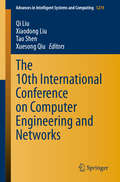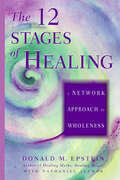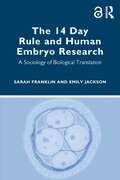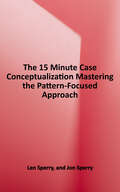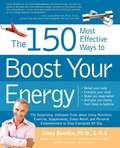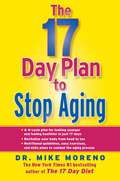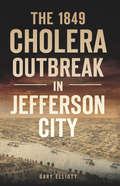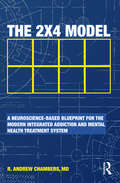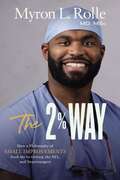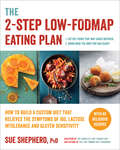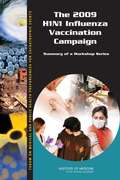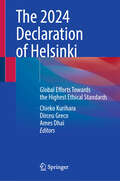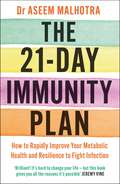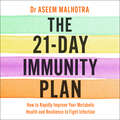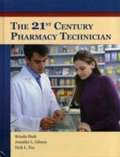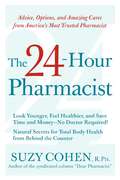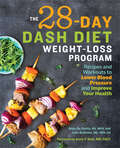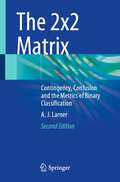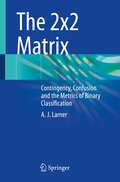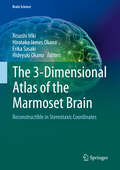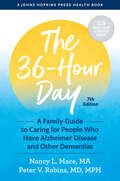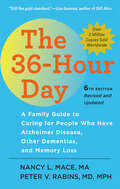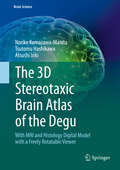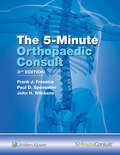- Table View
- List View
The 10th International Conference on Computer Engineering and Networks (Advances in Intelligent Systems and Computing #1274)
by Xuesong Qiu Qi Liu Xiaodong Liu Tao ShenThis book contains a collection of the papers accepted by the CENet2020 – the 10th International Conference on Computer Engineering and Networks held on October 16-18, 2020 in Xi’an, China. The topics focus but are not limited to Internet of Things and Smart Systems, Artificial Intelligence and Applications, Communication System Detection, Analysis and Application, and Medical Engineering and Information Systems. Each part can be used as an excellent reference by industry practitioners, university faculties, research fellows and undergraduates as well as graduate students who need to build a knowledge base of the most current advances and state-of-practice in the topics covered by this conference proceedings. This will enable them to produce, maintain, and manage systems with high levels of trustworthiness and complexity.
The 12 Stages of Healing: A Network Approach to Wholeness
by Donald M. EpsteinAn Extraordinary New Approach to Healing the Mind and Body Have you, or someone you love, experienced . . . • A recurring sickness, healing crisis, or life-threatening illness? • A feeling of emptiness and longing for no apparent reason? • A major trauma, emotional hardship, or life-changing event? • A feeling of being stuck in a pattern of self-destructive behavior? The Twelve Stages of Healing offers fascinating insights into the complex relationship between mind, emotions, and body, and shows how to promote greater health in our bodies, and harmony in our relationships. After observing thousands of people in both private practice and public seminars, Dr. Epstein discovered twelve basic rhythms, or stages of consciousness, shared by all humanity. Each stage of healing has a distinct “rite of passage” that helps us to reunite with aspects of ourselves that are traumatized, alienated, forgotten, abused, shamed, or unforgiven. Each stage also has a characteristic pattern of breath, movement, and touch that can help us to reconnect with the natural, internal rhythms of our body, and experience a greater sense of joy and well-being.
The 14 Day Rule and Human Embryo Research: A Sociology of Biological Translation
by Sarah Franklin Emily JacksonThis assessment of Britain’s influential 14 day rule governing embryo research explores how and why it became the de facto global standard for research into human fertilisation and embryology, arguing that its influence and stability offers valuable lessons for successful biological translation.One of the most important features of the 14 day rule, the authors claim, is its reliance on sociological as well as ethical, legislative, regulatory and scientific principles. The careful integration of social expectations and perceptions, as well as sociological definitions of the law and morality, into the development of a robust legislative infrastructure of ‘human fertilisation and embryology’, enabled what has come to be known as the Warnock Consensus – a solid and enduring public acceptance that has enabled successive parliamentary approval for controversial areas of scientific research in the UK, such as stem cell research and mitochondrial donation, for over 30 years. These important sociological insights are increasingly relevant to new biotranslational challenges such as human germline gene editing and the use of AI assisted technologies in human reproduction. As the legislation around the 14 day rule begins to be reviewed worldwide, the important lessons we can learn from its global and enduring significance will apply not only to future legislation governing embryo research, but to the future of biological translation more widely.An important volume for those interested in reproductive studies, biogovernance and biological translation, it is suitable for researchers, clinicians and students in medicine, biosciences, sociology, and science and technology studies.
The 15 Minute Case Conceptualization: Mastering the Pattern-Focused Approach
by Len Sperry Jon SperryOnce understood as useful but optional, case conceptualization is now considered essential and one of the most important of all clinical skills and competencies. As clinicians look for resources to assist in learning and mastering this competency, they must choose among different case conceptualization approaches considering those that are both clinically effective and clinician friendly. <p><p>A truly clinically effective approach explains and guides treatment, and most importantly, predicts challenges and obstacles that are likely to arise over the course of treatment. Most approaches emphasize explaining and guiding treatment but seldom include third function which helps anticipate likely challenges, which if not proactively addressed, are likely to result in therapy interference or premature termination. Research shows that such case conceptualization is essential in determining the course and overall effectiveness of therapy. <p><p>This essential task can be completed in as little as fifteen minutes. A truly clinician-friendly approach is one that is quick to use and easy to master. The 15 Minutes Case Conceptualization is evidence-based, step-by-step approach that is both highly effective and clinician friendly.
The 150 Most Effective Ways to Boost Your Energy: The Surprising, Unbiased Truth About Using Nutrition, Exercise, Supplements, Stress Relief, and Personal Empowerment to Stay Energized All Day
by Jonny BowdenThe 150 Most Effective Ways to Boost Your Energy shows anyone how to get more energy out of their body--naturally. Nationally known health expert Jonny Bowden presents small changes anyone can implement up front for big energy--such as what to eat for all-day endurance, when to time a workout for the biggest brain boost, or how working with (or against) natural light cycles can make your sleep restorative or slump-inducing. Energy starts with attitude-readers will learn how to think like a high-energy person and use breathing techniques, meditation, and exercise to bust stress, beat fatigue, and boost stamina. Readers learn how physical factors such as toxins, eating patterns, and nutritional deficiencies can sabotage strength-and how they can be corrected with proper diet and supplements.The 150 Most Effective Ways to Boost Your Energy gives readers a complete program to go from exhausted to energized.
The 17 Day Plan to Stop Aging
by Mike MorenoFrom the author of the #1 bestselling The 17 Day Diet, the inspiring and easy-to-follow plan for staying young and healthy, based on the same 17 day model that made the diet the bestselling diet book of 2011.Every year, every month, every day, every hour, every minute that you are alive, you are getting older. No matter how old you are, your body is undergoing age-related changes that can lead to less energy, painful joints, droopy skin, unsightly wrinkles, and overall declining health. But what if someone told you that getting older and the physical process of aging don’t have to be so closely entwined? And what if you had the ability to slow down the aging of your body so much that you could actually live to see, and more important, enjoy your 100th birthday or beyond? From feeling pain in your joints to realizing that your memory isn’t what it used to be, our bodies all suffer from wear and tear as we get older. But Dr. Mike Moreno—author of the #1 bestselling sensation The 17 Day Diet—explains that it is totally within your power to prevent and even reverse these symptoms of aging. The 17 Day Plan to Stop Aging is a 4-cycle plan that uses nutrition, physical fitness, and mental exercise to get you ready for longevity. Each cycle focuses on a different set of body parts and offers prescriptive solutions for improving the way those parts function. The plan is set up so that you can target specific areas or work on improving whole-body health at once. From your heart to your lungs, your nervous system to your reproductive system, the book is packed with information about what you can do to start feeling more vital. The 17 Day Plan to Stop Aging puts the power in your hands so you will never have to fear the prospect of old age again. Dare to imagine not just living 100 years, but thriving for all of them. The time to get started is now! *** The 17 Day Plan to Stop Aging is a 4-cycle system designed to help you feel healthier and younger. Whether you want to focus on a specific part of your body or feel rejuvenated from top to bottom, this is your guide to a happier, more vital life! • Cycle 1—Restore: The plan begins with basic anti-aging approaches that will help restore all of your body’s systems to a healthy baseline, stop potential medical problems before they start, and make way for a healthier, happier lifestyle—in 17 days flat. This cycle focuses on your heart, lungs, and brain, which Dr. Moreno considers to be the primary systems worthy of your immediate attention. • Cycle 2—Rebuild: This cycle shows you how to protect your immune, digestive, and musculoskeletal systems. Through simple shifts in diet, unexpected ways to get your body moving, and a healthy dose of common sense, it’s easy to strengthen these secondary systems so they can do their most efficient work for years to come. • Cycle 3—Refine: When your reproductive and urinary systems are performing properly, you are most likely to feel energetic and sexy. Whether you want to avoid unpleasant symptoms like urinary incontinence or your goal is to keep your sex life thriving for years to come, Cycle 3 offers tools that you can easily apply to your life. • Cycle 4—Renew: The strategies you’ll master in the last 17 days of this plan will not only leave you feeling rejuvenated, but they will ensure that you are ready to make the most—in every way—of the long, happy, and healthy life that you’re working toward. The vital elements in this final cycle help you achieve true harmony among your health, environment, and overall lifestyle.
The 1849 Cholera Outbreak in Jefferson City (Disaster)
by Gary ElliottIn 1849, a steamship named after President James Monroe headed from St. Louis to Council Bluffs, Iowa. The passengers were members of the Church of Jesus Christ of Latter-day Saints from Philadelphia. At St. Louis, they were joined with a group of California gold diggers from Jeffersonville, Indiana. But their trip was interrupted when cholera broke out on board. Local fourteen-year-old James McHenry discovered the steamship after it landed at Jefferson City and observed the dead and dying victims along the riverbank. Author Gary Elliott details the history of the outbreak in the city and its far-reaching effects.
The 2 x 4 Model: A Neuroscience-Based Blueprint for the Modern Integrated Addiction and Mental Health Treatment System
by Robert Andrew ChambersOver a quarter century of studies have shown that addictions, mental illnesses, and their combinations (dual diagnoses) are pervasive in the general population. Meanwhile, emerging neuroscience is revealing that the neurodevelopmental basis of major mental illness and addiction diseases are tightly interconnected and often unified pathologies of the brain. This science calls into question the profound split between the addiction and mental health fields that define our fragmented research, professional training, and treatment delivery systems—a split that leaves most patients out of reach of adequate professional expertise and evidence-based standards of care. The 2 x 4 Model, as described in this translational textbook of Addiction Psychiatry, is the essential blueprint and operational manual for the fully integrated, expertly staffed, Dual Diagnosis clinic— a clinic that is maximally capable and efficient in treating the full spectrum of addictions, mental illness, and their comorbidities, through integration of psychotherapies and medications, by one team under one roof. Replication of 2 x 4 Model Clinics into a national system would allow widespread access to excellent, transparent standards of Addiction Psychiatry as a decisive measure against mass incarceration and the exploding health care crisis of untreated addictions, all while rebuilding brain health as a core public health, social and economic imperative of modern society.
The 2% Way: How a Philosophy of Small Improvements Took Me to Oxford, the NFL, and Neurosurgery
by Dr. Myron L. RolleYou don't have to change your life overnight--instead, you can make small changes that leave a lasting impact. In The 2% Way, discover the simple, revolutionary practice behind the against-the-odds success story of Dr. Myron L. Rolle.Dr. Rolle has led a remarkable life: from earning a scholarship to a prestigious private high school to becoming a top-rated recruit at Florida State University; from winning the Rhodes Scholarship for study at Oxford to playing football in the NFL and then becoming a neurosurgery resident at Harvard.In this inspiring book, Dr. Rolle tells the story of his incredible journey, revealing how a strong work ethic, deep faith, and the family values instilled by his Bahamian immigrant parents set the stage for the transformative life philosophy that enabled him to overcome adversity, defy expectations, and create a life of meaning and purpose.Whether you're struggling with your own obstacles, looking to improve yourself, searching for your purpose and identity, or seeking inspiration, Dr. Rolle's story will give you the encouragement and tools you need to:Make incremental improvements that lead to long-lasting resultsBuild a life full of purpose and meaningTackle life with the assurance that you're moving in the right directionThe 2% Way will change the way you think about self-improvement, proving that you have the power to make strides toward the life you've always dreamed of.
The 2-Step Low-FODMAP Eating Plan: How To Build A Custom Diet That Relieves The Symptoms Of Ibs, Lactose Intolerance, And Gluten Sensitivity
by Sue ShepherdNo more guesswork—go low-FODMAP for good food every day and lasting relief year-round If you suffer from a digestive disorder, you’re likely familiar with a long list of unknowns: I don’t look sick, so what’s wrong with me? What can I do to feel better? What foods exactly are causing me discomfort? Now, The 2-Step Low-FODMAP Eating Plan is here to answer those questions, provide delicious food that feels good to eat, and help pinpoint specific intolerances in less than eight weeks. Listen to your gut and go low-FODMAP—already proven the most effective dietary treatment worldwide for irritable bowel syndrome and other dietary conditions (including gluten, lactose, and fructose intolerances). Dr. Sue Shepherd’s all-new 2-step plan presents a reliable approach to identify what foods you can enjoy, and eliminate only those that cause symptoms (and that doesn’t necessarily mean gluten!): First: Restrict FODMAPs (certain poorly absorbed carbs) to discover a new baseline of health. Next: Slowly reintroduce them, step-by-step, to learn which FODMAPs are tolerable, and in what amounts. The Result: A custom-made eating plan with delicious food that will make you happy and healthier! With menu plans for adults, kids, vegetarians and vegans, anyone can do it. Dr. Shepherd also delivers a guide to shopping and how to approach food labels, travel information and tips for eating out, and over 80 crave-worthy recipes. Stop guessing what foods cause distress and start living symptom-free today! With 80 gut-friendly recipes full of flavor and low in FODMAPs! Breakfast: Pecan and Cinnamon Carrot Muffins Light Meals: Roasted Squash and Ginger Soup Main Meals: Moroccan Lamb with Lemon Spinach Vegetarian: Four-Cheese Risotto For Kids: Chicken Drumsticks; Lasagne Desserts: Chili Chocolate Cheesecake
The 2009 H1N1 Influenza Vaccination Campaign: Summary of a Workshop Series
by Institute of Medicine of the National AcademiesThe 2009 H1N1 vaccination campaign was one of the largest public health campaigns in U.S. history, vaccinating one-quarter of the population in the first three months. The IOM held three workshops in Raleigh, NC; Austin, TX; and Seattle, WA to learn from participants' experiences during the campaign and improve future emergency vaccination programs.
The 2024 Declaration of Helsinki: Global Efforts Towards the Highest Ethical Standards
by Chieko Kurihara Dirceu Greco Ames DhaiThis book takes you on a journey into the future of ethical research, offering a collection of expert commentaries on the latest revision of the World Medical Association's cornerstone document, exploring its profound implications for global health ethics and proposing a path for its improvement. The book consists of three main parts, each focusing on key issues of human rights, integrity and inclusivity, with each chapter enriching the discourse on ethical research practices. The first part provides contextual perspectives on the implementation of research ethics, particularly in the Global South and Asia, by gathering revealing insights from different corners of the globe. This is followed by forward-looking perspectives for international ethical principles, and the final part describes not only the transformation of the Declaration, but also pushes it forward as a dynamic framework for ethical innovation to achieve access to health for all. The 2024 Declaration of Helsinki could be marked by global discussions to be consolidated towards the highest ethical standards based on the experience of the COVID-19 pandemic, trends to promote the involvement of patients, participants and public in research projects, and the growing attention to data-driven research. Each chapter demonstrates the pathway to Ethical Innovation for Global Health. The 2024 Declaration of Helsinki: Global Efforts Towards Highest Ethical Standards is essential reading for scientists, practitioners, and policymakers committed to the highest standards of ethical conduct in research. Members of research ethics committees, pharmaceutical company employees, medical students, patients and members of the public involved in human research will also find this volume useful.
The 21-Day Immunity Plan: The Sunday Times bestseller - 'A perfect way to take the first step to transforming your life' - From the Foreword by Tom Watson
by Aseem Malhotra**THE SUNDAY TIMES BESTSELLER**'Brilliant! It's hard to change your life - but this book gives you all the reasons it's possible. From the first page to the last, one revelation after another.'JEREMY VINE'Brilliant . . . especially required reading in these COVID-19 days'LIZ EARLE'Metabolism, inflammation, and immunity are three sides of the same coin. Fix one and you fix them all. Dr Aseem Malhotra offers you a way to fix all three at once, and the solution is as easy as your fork.' PROFESSOR ROBERT LUSTIG, bestselling author of Fat Chance'This remarkable book will change your life. Beautifully written, it compiles in one place the health messages we all know make sense. PROFESSOR KAROL SIKORA, leading cancer specialist and Founding Dean, University of Buckingham Medical School'Read this book and follow the plan, it may save your life.' GURINDER CHADHA, OBE, director of Bend It Like Beckham'A crystal-clear roadmap to reverse the roots causes of our poor metabolic and immune health. It is the handbook of health for our time.' MARK HYMAN, New York Times bestselling author of Food Fix*******The simple, evidence-based diet plan to rapidly improve your metabolic health, help with normal immune function and likely reduce the risk of severe effects from Covid-19.Dr Aseem Malhotra is a leading NHS-trained cardiologist and a pioneer of lifestyle medicine. He has been at the forefront of citing the health conditions which make us vulnerable to the worst effects of Covid-19. Obesity, Type 2 diabetes and heart disease are high among them - and all indicators of poor metabolic health. The good news is that in just 21 days we can prevent, improve and even potentially reverse many of the underlying risk factors that exacerbate how infections, including Covid-19, affect us and improve our ability to recover from them. Giving us the evidence-based science behind the plan, Dr Malhotra shares how simple changes to our diet as well as daily exercise and stress relief can have remarkable results in improving our markers for metabolic health, even helping to put Type 2 diabetes into remission, reduce risk factors for heart disease, decrease weight and enhance vitality.Arguing for the huge benefits to global health of these highly effective lifestyle changes, he shows how just 21 days can help us to start the journey to lead a healthier and longer life.
The 21-Day Immunity Plan: The Sunday Times bestseller - 'A perfect way to take the first step to transforming your life' - From the Foreword by Tom Watson
by Dr Aseem Malhotra**THE SUNDAY TIMES BESTSELLER**'Brilliant! It's hard to change your life - but this book gives you all the reasons it's possible. From the first page to the last, one revelation after another.'JEREMY VINE'Brilliant . . . especially required reading in these COVID-19 days'LIZ EARLE'Metabolism, inflammation, and immunity are three sides of the same coin. Fix one and you fix them all. Dr Aseem Malhotra offers you a way to fix all three at once, and the solution is as easy as your fork.' PROFESSOR ROBERT LUSTIG, bestselling author of Fat Chance'This remarkable book will change your life. Beautifully written, it compiles in one place the health messages we all know make sense. PROFESSOR KAROL SIKORA, leading cancer specialist and Founding Dean, University of Buckingham Medical School'Read this book and follow the plan, it may save your life.' GURINDER CHADHA, OBE, director of Bend It Like Beckham'A crystal-clear roadmap to reverse the roots causes of our poor metabolic and immune health. It is the handbook of health for our time.' MARK HYMAN, New York Times bestselling author of Food Fix*******The simple, evidence-based diet plan to rapidly improve your metabolic health, help with normal immune function and likely reduce the risk of severe effects from Covid-19.Dr Aseem Malhotra is a leading NHS-trained cardiologist and a pioneer of lifestyle medicine. He has been at the forefront of citing the health conditions which make us vulnerable to the worst effects of Covid-19. Obesity, Type 2 diabetes and heart disease are high among them - and all indicators of poor metabolic health. The good news is that in just 21 days we can prevent, improve and even potentially reverse many of the underlying risk factors that exacerbate how infections, including Covid-19, affect us and improve our ability to recover from them. Giving us the evidence-based science behind the plan, Dr Malhotra shares how simple changes to our diet as well as daily exercise and stress relief can have remarkable results in improving our markers for metabolic health, even helping to put Type 2 diabetes into remission, reduce risk factors for heart disease, decrease weight and enhance vitality.Arguing for the huge benefits to global health of these highly effective lifestyle changes, he shows how just 21 days can help us to start the journey to lead a healthier and longer life.
The 21-Day Immunity Plan: The Sunday Times bestseller - 'A perfect way to take the first step to transforming your life' - From the Foreword by Tom Watson
by Dr Aseem MalhotraA simple, clear, scientifically proven plan to boost metabolic health and help our immunity to the virus Covid-19 by one of the world's most influential cardiologists.Dr Aseem Malhotra, a leading NHS cardiologist, has led the way in citing obesity, Type 2 diabetes and heart disease as frequent factors in those hospitalised with coronavirus. He shows how they result from poor metabolic health, including an over-dependence on ultra-processed foods, which seriously affects our immune response. In this life-changing 21 Day Plan he brings us the good news that we can reverse our health and rapidly improve our resilience to infection and disease through just a few simple lifestyle changes - to our diet, how we exercise and sleep, and reduce stress.(P) 2020 Hodder & Stoughton Ltd
The 21st Century Pharmacy Technician
by Nick L. Tex Jennifer L. Gibson Brinda ShahThe 21st Century Pharmacy Technician covers the foundations and principles that a student needs to know in order to practice as a pharmacy technician and sit for the certification exam. Students are given an introduction to the profession from the perspective of both community and institutional pharmacy settings. With accessible language and an easy-to-read format, this text helps students grasp concepts easily. It provides a comprehensive introduction to the pharmacy profession, pharmacy laws, pharmacology, drug dosages, drug safety, and more, in preparation for a future as a pharmacy technician. Topics covered include:#149; Laws, Regulations, and Standards#149; Pharmacy Math#149; Diseases and the Drugs Used in Treatment#149; Dosage, Administration, and Dispensing of Medications#149; Medication Safety#149; Sterile and Non-sterile Compounding#149; Communication#149; Business of the Community Pharmacy#149; Managing the Patient Profile#149; Processing Prescriptions
The 24-Hour Pharmacist: Advice, Options, and Amazing Cures from America's Most Trusted Pharmacist
by Suzy CohenAs a pharmacist for almost two decades, Suzy Cohen knows that medication can often be invaluable. But she has also learned to "think outside the pill" and recommend natural options that are often just as good or better at promoting health without the risk of dangerous, drug-induced side effects. In this comprehensive, one-of-a-kind resource, she answers such questions as:How can I stop my husband/wife from snoring?Are vitamin pills worth it or worthless?Are there alternatives to antidepressants?What kind of surge protection is there for hot flashes?How can I train my body to lose fat?
The 28 Day DASH Diet Weight Loss Program: Recipes and Workouts to Lower Blood Pressure and Improve Your Health
by Julie Andrews MS, RDN, CD Andy De Santis RD, MPHLose weight and lower your blood pressure with a DASH diet and exercise plan Learn how to better manage your weight by combining the naturally balanced DASH diet with simple but effective lifestyle changes. Featuring a full meal plan as well as guides for exercise, dealing with stress, and even improving your sleep, this standout among diet books for weight loss gives you the tools for long-term health. This DASH diet guide includes: A 28-day plan—Skip the research and guesswork with a complete overview of the DASH diet and weeks of guided meals, with simple tips and instructions to get you started. A holistic approach—Stay on course with exercise charts and habit trackers that let you record your progress and see where you're succeeding and where you need a little help. Tasty recipes—Going DASH doesn't mean giving up your favorites. Learn health-conscious ways to whip up everything from Crispy Fish Sandwiches to Sweet Potato Pancakes. Live your healthiest life with this complete guide to the DASH diet.
The 2x2 Matrix: Contingency, Confusion and the Metrics of Binary Classification
by A. J. LarnerThis book describes, extends, and illustrates the metrics of binary classification through worked examples.Worked examples based on pragmatic test accuracy study data are used in chapters to illustrate relevance to day-to-day clinical practice. Readers will gain an understanding of sensitivity and specificity and predictive values along with many other parameters.The contents are highly structured, and the use of worked examples facilitates understanding and interpretation.This book is a resource for clinicians in any discipline who are involved in the performance or assessment of test accuracy studies and professionals in the disciplines of machine learning or informatics wishing to gain insight into clinical applications of 2x2 tables.
The 2x2 Matrix: Contingency, Confusion and the Metrics of Binary Classification
by A.J. LarnerThis book presents and discusses the numerous measures of test performance that can be derived from 2x2 tables. Worked examples based on pragmatic test accuracy study data are used in chapters to illustrate relevance to day-to-day clinical practice. Readers will gain a good understanding of sensitivity and specificity and predictive values along with many other parameters.The contents are highly structured and the use of worked examples facilitates understanding and interpretation. This book is a resource for clinicians in any discipline who are involved in the performance or assessment of test accuracy studies, and professionals in the disciplines of machine learning or informatics wishing to gain insight into clinical applications of 2x2 tables.
The 3-Dimensional Atlas of the Marmoset Brain: Reconstructible In Stereotaxic Coordinates (Brain Science)
by Atsushi Iriki Hirotaka James Okano Erika Sasaki Hideyuki OkanoThis book provides accurate, comprehensive, and convenient reference for usages of the “freely rotatable three dimensional combined Nissl-stained and MRI digital data of the marmoset brain”. The key features of the original 3D digital data and of this atlas are: 1. The original digital datasets are freely rotatable in three dimensions, thus expected to be useful for any disciplines and anatomical interest, using any coordinate system, 2. Combined Nissl stained and MRI images are obtained from the same marmoset, to allow cross-modality matched references for multiple usages, 3. 86 Horizontal Series of Images with Neurosurgical Plane (based on the actual data), with more accuracy and resolution (Chapter 2) than the web-based digital images, 4. 32 Coronal Series of Images with Neurosurgical Plane (reproduced from the brain model) (Chapter 3), 5. 10 Parasagittal Series of Images with Neurosurgical Plane (reproduced from the brain model) (Chapter 4), 6. 3 Omnidirectionally Sliceable Planes (reproduced from the brain model) (Chapter 5), 7. In order to provide higher resolution structures to match systematic accuracy for supplementation of the digital data on the website, additional information are included. They are: 1) Nomenclature, 2) List of Brain Structures in Hierarchical Order, 3) Index of Abbreviations, together with 143 useful Bibliographic References list as of 2016, 8. Horsley-Clarke’s stereotaxic coordinates were adopted in the present atlas.
The 36-Hour Day: A Family Guide to Caring for People Who Have Alzheimer Disease and Other Dementias (A Johns Hopkins Press Health Book)
by Nancy L. Mace Peter V. RabinsWith over 3.5 million copies sold, the bestselling guide to understanding and caring for people with dementia is now completely revised and updated!For 40 years, The 36-Hour Day has been the leading work in the field for caregivers of those with dementia. Written by experts with decades of experience caring for individuals with memory loss, Alzheimer's, and other dementias, the book is widely known for its authoritativeness and compassionate approach to care. Featuring everything from the causes of dementia to managing its early stages to advice on caring for those in the later stages of the disease, it is widely considered to be the most detailed and trusted book available. Highlighting useful takeaway messages and informed by recent research into the causes of dementia, this new edition has been completely updated. It features • brand-new content on everything from home care aides to useful apps to promising preventative techniques and therapies• practical advice for avoiding caregiver burnout—plus tips for when and how to get additional help• a completely new two-column design that allows readers to quickly access what they needThe central idea underlying this indispensable book—that much can be done to improve the lives of people with dementia and of those caring for them—remains the same. The 36-Hour Day is the definitive dementia care guide.
The 36-Hour Day: A Family Guide to Caring for People Who Have Alzheimer Disease, Other Dementias, and Memory Loss (A Johns Hopkins Press Health Book)
by Nancy L. Mace Peter V. RabinsAfter 35 years, still the indispensable guide for countless families and professionals caring for someone with dementia.Through five editions, The 36-Hour Day has been an essential resource for families who love and care for people with Alzheimer disease. Whether a person has Alzheimer disease or another form of dementia, he or she will face a host of problems. The 36-Hour Day will help family members and caregivers address these challenges and simultaneously cope with their own emotions and needs.Featuring useful takeaway messages and informed by recent research into the causes of and the search for therapies to prevent or cure dementia, this edition includes new information on• devices to make life simpler and safer for people who have dementia• strategies for delaying behavioral and neuropsychiatric symptoms• changes in Medicare and other health care insurance laws• palliative care, hospice care, durable power of attorney, and guardianship• dementia due to traumatic brain injury• choosing a residential care facility• support groups for caregivers, friends, and family membersThe central idea underlying the book—that much can be done to improve the lives of people with dementia and of those caring for them—remains the same. The 36-Hour Day is the definitive dementia care guide.
The 3D Stereotaxic Brain Atlas of the Degu: With Mri And Histology Digital Model With A Freely Rotatable Viewer (Brain Science)
by Noriko Kumazawa-Manita Tsutomu Hashikawa Atsushi IrikiThis book is the first digital atlas of the degu brain with microscopic features simultaneously in Nissl sections and magnetic resonance imaging (MRI). As an experimental animal model, the degu contributes to a variety of medical research fields in diabetes, hyperglycemia, pancreatic function, and adaptation to high altitude, among others. Recently the degu has gained increasing importance in the field of neuroscience, particularly in studies evaluating the relationship between sociality and cognitive brain functions, and in studies pertaining to the evolutional aspects of the acquisition of tool-use abilities. Furthermore, aging-related brain dysfunction in humans can be studied using this animal model in addition to mammals with much longer lifespans. This brain atlas is constructed to provide histological and volume-rendered information simultaneously, fitting with any spatial coordination in brain positioning. It can be a useful guide to degus as well as to other rodents for studies of brain structures conducted using MRI or other contemporary examination methods with volume-rendering functions.
The 5 Minute Orthopaedic Consult (The 5-Minute Consult Series)
by Frank J. FrassicaThe new edition covers 285 conditions, disorders, and diseases routinely seen by orthopaedic surgeons, orthopaedists, primary care physicians, and physical therapists. Topics presents disease or condition history, epidemiology, assessing the patient, diagnosis, treatment, therapy, and other important information. Illustrations are embedded throughout, and provide much-needed visual context to the written content.
